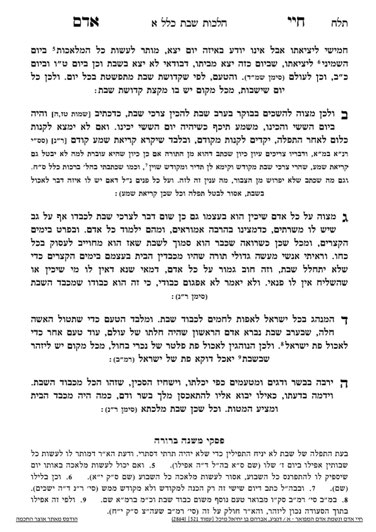We are beginning siman 2. The Chayei Adam points out that there is a mitzvah to prepare for Shabbos. In the context of what we learned in siman 1, it is an element of the mitzvah of zachor es yom hashabbos lekadesho. By preparing for Shabbos, one is expressing their concern and interest in Shabbos, so they fulfill this mitzvah deoraysa.
The Chayei Adam writes that it is specifically a mitzvah to prepare for Shabbos as early as possible. Part of the mitzvah zachor es yom hashabbos lekadesho is to prepare for Shabbos as early as possible is to show that one wants the preparations to be done in an appropriate amount of time before Shabbos so there are no concerns of entering Shabbos without the proper preparations or with chilul Shabbos, chas veshalom.
The Chayei Adam writes that the pasuk hints to this idea. The pasuk says, vehaya bayom hashishi, ve’heichinu es asher yavi’u. This pasuk is said regarding the mann, that a double portion would fall on Friday for Shabbos. Hashem is telling Klal Yisroel that they should take of the double portion and prepare (bake, cook, etc) for Shabbos. The Chayei Adam understands that the hint in the pasuk is the fact that it says vehaya bayom hashishi indicates they would do it immediately in the morning.
Practically, this mitzvah means that we would have to go buy food and prepare it immediately in the morning. We need to discuss whether this can be done before davening. On the one hand, one is not allowed to take care of personal needs before davening, but on the other hand, this is a mitzvah, and we know that mitzvah needs can be done before davening.
We have a concept of tadir v’she’eino tadir, tadir kodem. When we have a conflict between two mitzvos, the one which takes place more commonly takes precedence. If so, tefillah, which is done every day, should take precedence over Shabbos. However, the Chayei Adam clarifies that the mitzvah which is more common takes precedence only when both mitzvos can be performed, and it is only a question of which to do first. If the other mitzvah will no longer be available after performing the first one, the one which is time-limited takes precedence. If so, if a person will be unable to purchase their needs for Shabbos after davening, they would be allowed to do it before davening. Otherwise, they should daven first.
In a scenario where one is making their purchases before davening, the Chayei Adam clarifies that it is appropriate to recite kriyas shema, which is a mitzvah deoraysa, before making their purchases. Since the mitzvah of kriyas shema occurs twice a day, and we can assume a person will not lose out from the few minutes it takes to recite, we apply the concept of tadir,
In the parentheses, the Chayei Adam challenges this halacha. The source for this opinion is the Magen Avraham. The Chayei Adam challenges that, although preparing for Shabbos may not be as common as davening, it has a uniqueness to it in that it has the kedusha of Shabbos, so it should always take precedence to davening.
The Chayei Adam makes another point in the parentheses. He writes that there is a difference between one who has nothing prepared for Shabbos, and one who already has basic needs prepared for Shabbos, but wishes to make more purchases to enhance his Shabbos. In the latter situation, tefillah and kriyas shema will certainly take precedence to purchasing.
Summary
One should prepare for Shabbos as early as possible on Friday morning. However, unless they will be unable to do basic preparations, their preparations do not take precedence over davening.



